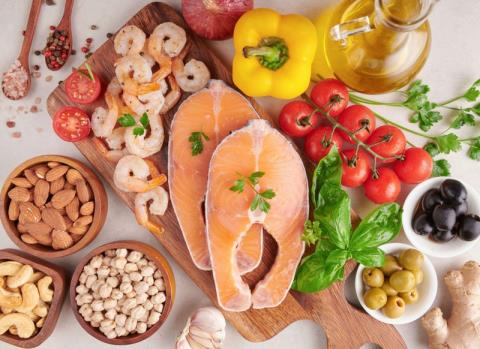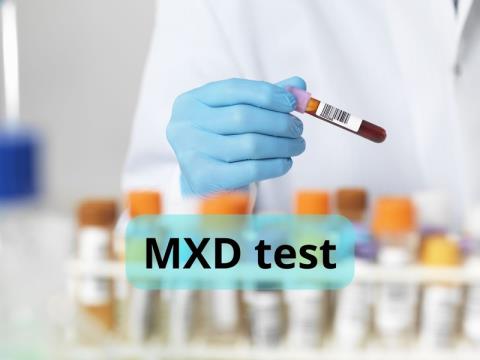Can I eat plums after giving birth? That can be a question that many mothers during confinement will ask. Because, during this time, the mother's body is very weak, eating and resting properly will help the mother avoid postpartum diseases.
Plum is a sweet and sour fruit and is one of the favorite fruits of many people. But to answer the question after giving birth, can you eat plums, please refer to the article below of SignsSymptomsList.
Some benefits of eating plums
A plum is a fruit with a green outer skin that turns red when ripe. Small sized fruit, every 100 grams of fresh plums will contain 8 grams of carbs with vitamins like 5% vitamin A, 10% vitamin C, 5% vitamin K and small amounts of B vitamins, copper, potassium, phosphorus, iron and magnesium .
Plum is a fruit that contains many nutrients that are good for mothers
With such a diverse nutrient content, plums offer the following health benefits:
- Helps healthy hair, beautiful skin: Plums contain a lot of vitamin A , which will help mothers' skin after birth become brighter and more even. When vitamin A is absorbed to help the mother's eyesight, in addition, vitamin A also helps the mother's body easily provide more iron and magnesium. These two minerals are used to help strengthen the mother's bones and reduce hair loss after giving birth.
- Improved memory: Plums contain antioxidants that help the body repair damaged brain cells. From there, the forgetfulness common in postpartum mothers will be improved.
- Good for the digestive system: Plums contain two compounds, isatin and sorbitol, which are good for the digestive system, helping to promote intestinal health.
- Good for the heart: Plums contain a lot of potassium along with other substances that help stabilize blood sugar that can help you get rid of LDL cholesterol (bad cholesterol). Therefore, eating plums is very good for the heart health of the mother after giving birth to help prevent atherosclerosis and high blood pressure.
- Prevent cancer: Plums contain an active antioxidant with the effect of removing stem cells that cause cancer, especially colon cancer.
- Helps the body absorb iron: After giving birth, the mother has lost a lot of blood, so she needs iron supplements. On average, each plum can provide 10% of the body's daily vitamin C needs, supporting the body in the absorption of iron. In addition, such high vitamin C content helps mothers increase their resistance to diseases and infections after birth.
- Supports weight loss: Plums contain few calories and many good vitamins and minerals, if the mother eats a sufficient amount, it will be very good for the weight loss process.
- Helps reduce blood sugar: Prunes are low in sugar, eating them also helps you reduce blood sugar, reducing the risk of diabetes. In addition, plum is a fruit that contains a lot of fiber , which helps the mother control blood sugar, especially after she eats a lot of starch in her daily food intake.
Can mothers after giving birth eat plums?
As mentioned above, you have seen the benefits that plums bring to women after giving birth. Although the benefits of plums for the mother's body are indisputable, but are there any harmful effects of plums? Can a mother in the postpartum period eat plums? Please continue to follow the answer to the question right below.
Can mothers after giving birth eat plums?
Can mothers after giving birth eat plums? With the benefits mentioned above, it can be concluded that after giving birth, the mother can eat plums. So what is the right amount of food? You can eat but should eat in moderation. However, if you do not eat properly, you may face some problems as follows:
Eating plums is harmful to the stomach
Plum is a fruit that contains sour substances and is rich in vitamin C. Therefore, if the mother has a history of stomach disease and eats a lot of plums, it will cause more damage to the stomach, and the disease may recur. becomes more severe.
Eating plums causes tooth sensitivity
Plum is a fruit with a sour taste and high acidity, when eating too many plums, the mother can feel tooth sensitivity, increasing the likelihood of tooth decay. This not only happens to mothers after giving birth, but everyone can suffer from eating plums too much. For mothers after giving birth, teeth and gums are often very weak, so eating sour is very harmful. Therefore, in the early stages of childbirth, mothers should limit acidic foods such as plums, toads, and mangoes.
Eating plums after giving birth may increase the risk of kidney stones
Although the nutritional content of plums is very high, plums also contain an active ingredient called oxalate. This substance when entering the body will interfere with the absorption of calcium , this causes calcium to be deposited in the body, so it can cause constipation or kidney stones after birth.
Eating plums causes heat in the body
Plums are inherently hot, so after eating plums, if you have a fever in your mouth and acne, you may be hot inside. This can affect the baby because it can affect the quality of milk when breastfeeding.
Some notes to eat plums for mothers after giving birth
When knowing the benefits and harms of eating plums after giving birth, are you wondering: "How to eat plums for good health after birth?"
Some things to be safe for health that mothers need to pay attention to when eating plums after giving birth
After giving birth, the mother should only eat plums after the period of confinement, because plums are highly acidic, so it is not good for the mother's teeth and digestive system. Therefore, when the mother wants to eat plums to relieve her cravings, she should eat them after the period of confinement (the first 42 days after giving birth). However, there are a few things to keep in mind when eating plums:
Do not eat too many plums
Because plums can cause heat in the body, if eaten a lot, it will cause acne and heat rash. Therefore, every day, the mother should only eat a maximum of 4-5 fruits per day to ensure safety for health, as well as not to eat too often.
Do not eat plums when you have an upset stomach
Due to the high acidity of plums, it can increase the acidity of the stomach. This makes the disease worse and worse. Therefore, postpartum mothers who have had stomach pain before should abstain from eating plums to avoid recurrence of the disease.
Do not eat off-season plums
Mother should buy plums in the right plum season. Normally, plum season falls in the period from March to July. When the mother eats plums off-season, the plum may not have a guaranteed origin or contain a lot of pesticides and preservatives. From there, there may be a risk of poisoning or infection for the mother.
Hope the above article has helped you answer the question " Can you eat plums after giving birth ?". SignsSymptomsList hopes that the article helps mothers better understand the benefits and harms of eating plums. After giving birth, remember not to eat plums too soon to avoid affecting your health.








